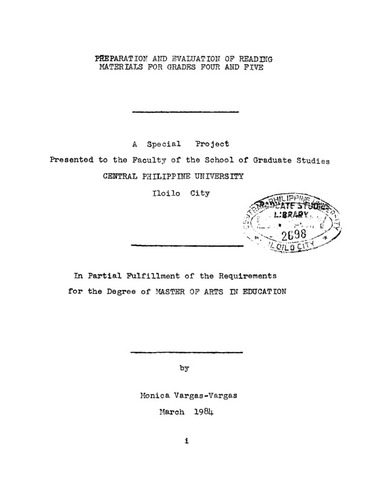Ipakita ang simpleng tala ng item
Preparation and evaluation of reading materials for grades four and five
| dc.contributor.adviser | Herradura, Elma S. | |
| dc.contributor.author | Vargas, Monica V. | |
| dc.date.accessioned | 2021-09-21T03:02:03Z | |
| dc.date.available | 2021-09-21T03:02:03Z | |
| dc.date.issued | 1984 | |
| dc.identifier.citation | Vargas, M. V. (1984). Preparation and evaluation of reading materials for grades four and five (Unpublished Master’s special paper). Central Philippine University, Jaro, Iloilo City. | en_US |
| dc.identifier.uri | https://hdl.handle.net/20.500.12852/1412 | |
| dc.description | Introduction and statement of the problem | en_US |
| dc.description.abstract | The ability to read is recognized generally as one of the most important skills that a person can have. The success or failure of an individual in modern society greatly depends upon the mastery of this tool. Ever since man learned to read and write, he has depended immeasurably on the printed page for his personal, cultural, and social progress. The important role of reading in modern life cannot be underestimated. It is an indispensable means of communication. As Broom says, "It is a vehicle for obtaining ideas which cannot be transmitted verbally". The average citizen must read the papers, magazines and books to keep abreast with the latest technological advancements. Reading is a basic subject in the curriculum. It is a tool subject necessary for the mastery of all other subjects. It enters into nearly every phase of school life. "It is a key with which students could open the vast storehouse of knowledge contained in books,” Sutaria and Bowen declared. The importance of reading as a tool is pointed out by Bond and Tinker. They say, "The ability to read well is absolutely essential to successful school work or study of any kind". Many studies have shown that reading ability is a prerequisite for success in the elementary and secondary schools. Broom maintains that "the individual who reads well has at his command a means for widening his mental horizons and for multiplying his opportunities for experience". The ability to read well opens the way to a full and satisfying life for the individual. Next to the teacher, the textbook is usually the principal educative agency contributing to pupils’ academic success. In the SOUTELE survey one of the findings revealed that pupils find difficulty in reading and writing in English. One of the reasons cited for the poor performance of pupils in English is the lack of instructional materials. Innovations have been made and are being done in our educational system in order to raise the low performance level of pupils, especially in Reading. One of the programs embodying this planned change is the PRODED (Program for Decentralized Educational Development). One of its features is the implementation of the New Elementary School Curriculum (NESC). PRODED has some priority needs to meet in order to achieve its objectives and to implement the NESC effectively. One of these is the development of supplementary materials. Textbook and supplementary materials provided by the Textbook Project should be supplemented with learning materials keyed to the needs of children in specific geographical areas and of varying capacities to learn. There is a need for preparing materials geared to the unique needs and interests of children in the different regions of the country. The writer's desire to help meet the need for such materials and to improve the reading performance of pupils in her division led her to undertake this study. Objectives of the Study On the whole, this project study is an attempt to prepare and evaluate reading materials which are based on the abilities and interests of pupils in grades four and five, specifically for those in the district of Banate. This study also sought to achieve the following objectives: 1) To determine the types of stories that appeal to grades four and five pupils. 2) To establish the validity and usability of the reading selections prepared by the researcher. 3) To establish the validity and reliability of the test exercises that accompany each selection. | en_US |
| dc.description.sponsorship | Ministry of Education, Culture and Sports, Region VI scholarship grant | en_US |
| dc.format.extent | 213 leaves | en_US |
| dc.language.iso | en | en_US |
| dc.subject.ddc | GSL Theses 378.242 V426 | en_US |
| dc.subject.lcsh | Reading--Aids and devices | en_US |
| dc.subject.lcsh | Reading--Aids and devices--Evaluation | en_US |
| dc.subject.lcsh | Reading interests | en_US |
| dc.subject.lcsh | Children--Books and reading | en_US |
| dc.subject.lcsh | Reading (Elementary) | en_US |
| dc.subject.lcsh | Reading (Elementary)--Ability testing | en_US |
| dc.title | Preparation and evaluation of reading materials for grades four and five | en_US |
| dc.title.alternative | Preparation and evaluation of reading materials for grades 4 and 5 | en_US |
| dc.type | Special paper | en_US |
| dc.description.bibliographicalreferences | Includes bibliographical references | en_US |
| dc.contributor.chair | Herradura, Elma S. | |
| dc.contributor.committeemember | Alba, Leda G. | |
| dc.contributor.committeemember | Ruiz, Macario B. | |
| dc.contributor.committeemember | Cang, Febe A. | |
| dc.contributor.committeemember | Stanford, Winnifred | |
| dc.contributor.committeemember | Griño, Eliza U. | |
| dc.contributor.committeemember | Traviña, Miriam M. | |
| dc.contributor.committeemember | Porter, Josefina Y. | |
| dc.contributor.department | School of Graduate Studies | en_US |
| dc.description.degree | Master of Arts in Education with specialization in Reading (English) | en_US |


